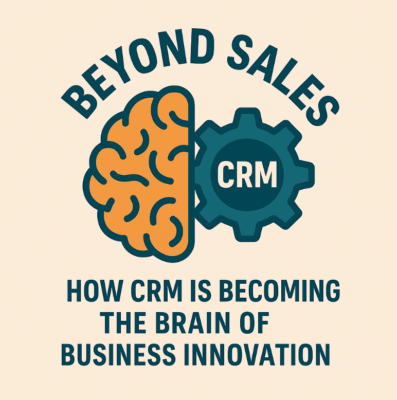
Customer Relationship Management (CRM) has evolved far beyond its initial purpose of managing customer interactions and sales pipelines. Today, CRM systems serve as the central intelligence hub of businesses, integrating data, automation, and AI-driven insights to fuel innovation and strategic decision-making. Here’s how CRM is transforming into the brain of modern business innovation.
1. Data-Driven Decision Making
CRM systems collect vast amounts of data from customer interactions, sales performance, and marketing campaigns. Advanced analytics and AI tools embedded within CRM platforms enable businesses to extract meaningful insights from this data. By understanding customer preferences, market trends, and operational efficiency, companies can make informed, data-driven decisions that drive innovation and competitive advantage.
2. Enhancing Customer Experience Through AI
Artificial Intelligence (AI) is revolutionizing CRM by automating tasks, predicting customer behavior, and personalizing experiences. Chatbots powered by AI handle customer inquiries in real time, while machine learning algorithms analyze past behaviors to recommend relevant products and services. This proactive approach enhances customer satisfaction and fosters long-term loyalty, positioning businesses ahead of their competitors.
3. Seamless Integration Across Departments
Modern CRM platforms integrate seamlessly with other business tools, such as Enterprise Resource Planning (ERP), marketing automation, and customer support software. This cross-functional connectivity ensures that all departments work with the same real-time data, eliminating silos and improving efficiency. As a result, businesses can deliver a unified and innovative customer experience across all touchpoints.
4. Predictive Analytics for Market Trends
CRM is no longer just a historical record-keeping tool; it is now a predictive engine that helps businesses anticipate market shifts. Predictive analytics within CRM platforms analyze customer behavior, purchasing patterns, and economic trends to forecast future demand. Companies that leverage this capability can stay ahead of market changes and adjust their strategies proactively.
5. Automating Innovation Through Workflow Optimization
Automation is a key driver of innovation, and CRM plays a crucial role in streamlining business operations. By automating repetitive tasks such as follow-ups, data entry, and lead scoring, CRM frees up employees to focus on creative problem-solving and strategic planning. This efficiency boost fosters an environment where innovation can thrive.
6. Fostering Collaboration and Knowledge Sharing
CRM systems act as a centralized repository of knowledge, ensuring that valuable insights are easily accessible across teams. Whether it’s sales sharing customer feedback with product development or marketing adjusting campaigns based on real-time engagement data, CRM fosters a culture of collaboration that drives business innovation.
Conclusion
CRM is no longer just a tool for managing sales and customer relationships—it has become the strategic nerve center of modern businesses. By leveraging data-driven insights, AI-powered personalization, seamless integrations, predictive analytics, automation, and collaboration, CRM is transforming how companies innovate and compete. Businesses that embrace this evolution will not only enhance customer experiences but also unlock new opportunities for growth and success in an increasingly digital world.